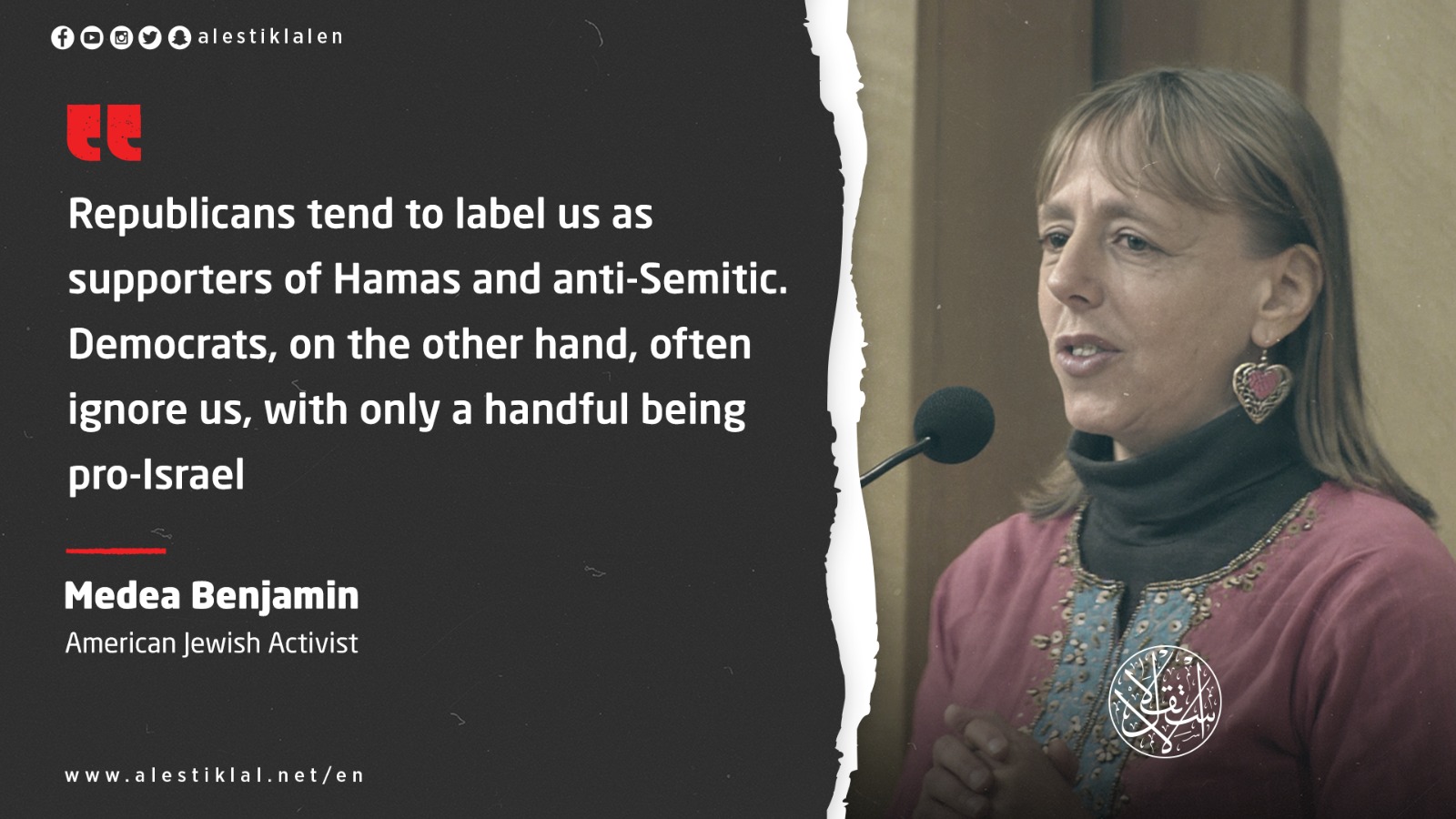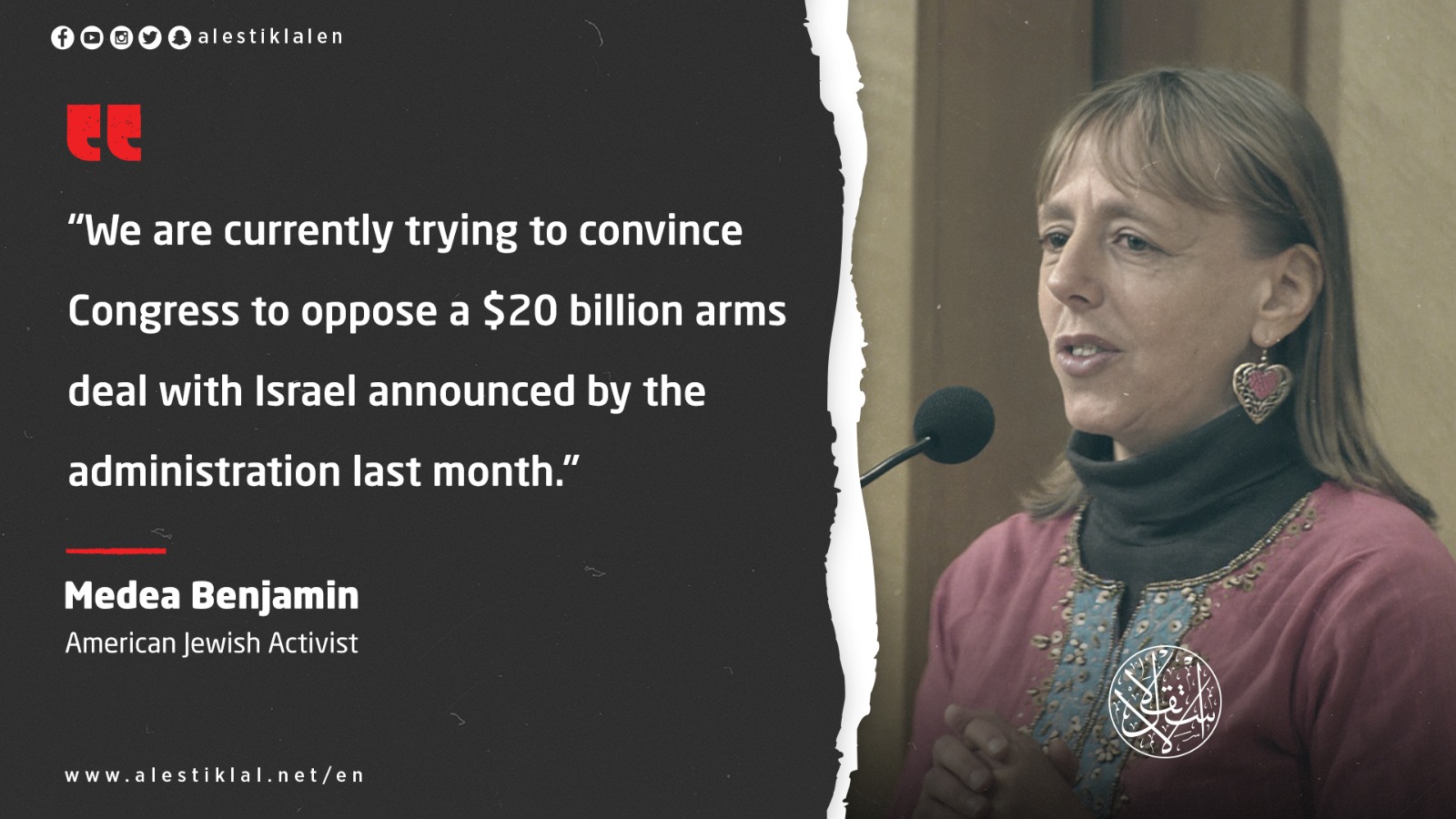American Jewish Activist: Congress’s Subservience to ‘Israel’ Complicates Ending War in Gaza (Exclusive)

“Pro-Israel media seeks to undermine the student movement.”
American Jewish activist Medea Benjamin believes that pressure on the U.S. government to stop supporting “Israel” with money and arms must continue to compel it to end its aggression on Gaza.
In an interview with Al-Estiklal, Benjamin emphasized that ongoing pressure is the only way for activists’ efforts to succeed against both the U.S. and “Israel.”
She also noted that “Israel’s killing of Turkish-American activist Aysenur Ezgi Eygi in Nablus, West Bank, on September 6, 2024, serves as a clear warning to anyone supporting the Palestinian cause that they face a similar fate.”
Benjamin pointed out that pro-Zionist media is working to discredit the student movements in America and Europe against “Israel” through falsehoods and by fostering division among students.
Born in New York on September 10, 1952, to a Jewish family, Susan Benjamin changed her name to Medea during her first year of college, influenced by a famous Greek legend.
In 1988, Benjamin and her husband founded Global Exchange, advocating for fair trade alternatives in a globalized world.
Her influence grew significantly in 2022 when she founded Code Pink, a peace-supporting group, and became known for targeting American lawmakers who support “Israel” to embarrass them.
Over time, Benjamin has become a formidable critic of successive U.S. administrations, particularly regarding American-supported wars in the Middle East.
Recently, during a House Armed Services Committee hearing, Benjamin stood with a pink sign reading “Long Live Gaza,” accusing the U.S. administration of supporting “genocide” in the Strip.
"The whole world is watching what we are doing in Gaza right now. Secretary General, you are supporting a genocide,” Benjamin shouted at U.S. Defense Secretary Lloyd Austin.
Against Wars
• How did your activism against wars begin? What is the best way to counter the U.S. administration’s policies?
My activism began over fifty years ago when I was in high school and the U.S. was engaged in a horrific war in Vietnam.
At that time, and today, I believe the best way to counter U.S. policies is to build a broad movement demonstrating strong public opposition to U.S. wars, especially the current war on Gaza.
It may start small, but it must be sustained and expanded over time, as is happening now.

• How do you see the response of both Republican and Democratic party members to activists opposing the recent Gaza war?
We express our opposition to U.S. policy daily in various ways. Republicans tend to label us as supporters of Hamas and anti-Semitic. Democrats, on the other hand, often ignore us, with only a handful being pro-Israel.
Both parties are influenced by the large financial interests of pro-Israel lobby groups, which makes it extremely difficult to sway them.
However, with elections approaching, we hope that more voters will voice their dissatisfaction with candidates’ positions, pressuring them to change their stances.
This approach requires a lot of patience and persistence. Activists with goals and principles continuously work, plan, conduct surveys, and present their findings to officials and members of legislative bodies.
• Can congressional members who oppose U.S. support for the Israeli Occupation achieve any of their goals?
It is crucial for more congressional members to speak out against the administration’s policies, but this becomes more challenging during election seasons.
The reason is that the members of Congress who are likely to speak candidly are mostly Democrats, who are eager to present a unified front to promote Democratic presidential candidate Kamala Harris, even if their actual views differ.
We are currently trying to convince Congress to oppose a $20 billion arms deal with Israel announced by the administration last month [August 2024].
So far, we have only one group willing to oppose this dangerous commitment to supplying Israel with weapons for years to come.
Nevertheless, we must continue to try because persistence and determination are key to influencing the administration and its members.
Anyone opposing these policies must remain consistently visible.

• What is your opinion on the American media's portrayal of university protests against the Israeli assault on Gaza?
It's alarming that American media portrays university protests as anti-Semitic and harmful to Jewish students on campus. From what I’ve observed, these protests often feature beautiful interactions between Muslim and Jewish students, where they support each other and share their customs and beliefs.
The media frequently misrepresents anti-Zionist positions as anti-Semitic, which is inaccurate. Many Jewish students are anti-Zionist, and I wish the media would acknowledge this.
Unfortunately, media outlets that support Israel and the occupation of Palestine work to distort student gatherings, portraying them as threats when they lack support from authorities for their suppression. This narrative aims to incite opposition against peaceful student demonstrations.
Normalization of Israeli-Saudi Relations
• You have previously accused the U.S. administration of arming Saudi Arabia in exchange for normalization with Israel. Can you tell us more about that?
Saudi Arabia and the United States are finalizing a historic deal to enhance bilateral trade and defense. This agreement will deepen the security alliance that has existed for seven decades, strengthening the relationship between the two countries.
The agreement will provide Saudi Arabia with security, economic, and technological guarantees, as well as support for its civilian nuclear program.
The U.S. hopes this deal will lead to a normalization agreement between Israel and Saudi Arabia. Both the U.S. and Israel are highly eager for this outcome.
However, the Saudis have stated that under current circumstances, with the ongoing war in Gaza and no clear path to a Palestinian state, this is unlikely to happen.
• Is this factual information or merely a political interpretation?
This information is widely known and has been confirmed by officials from Saudi, U.S., and Israeli sides, though often in private sessions. It has been publicly acknowledged on multiple occasions.

Other Issues
• What do you think about U.S. activities in the Red Sea against the Houthis?
Many people worldwide see the Houthis as the only ones taking concrete steps to enforce a blockade on goods heading to Israel.
In reality, the Houthis are operating under the mandate of the International Court of Justice, which deems the occupation of Gaza, the West Bank, and Jerusalem as illegal and asserts that no state should support this occupation.
• How do you view the killing of American activist Nur Ezgi in the West Bank by Israeli forces?
It is horrifying that the Israeli military killed this young woman, who was participating in a peaceful protest to support Palestinian farmers defending their land from Israeli settlers.
This incident is particularly significant because Ezgi was American-Turkish, affecting both the U.S. and Turkiye. However, the Israeli military kills people in the West Bank daily.
Over 600 Palestinians have been killed in the past ten months. Israel aims to seize the West Bank to fulfill its expansionist dreams and negatively impact the prospect of a Palestinian state.









